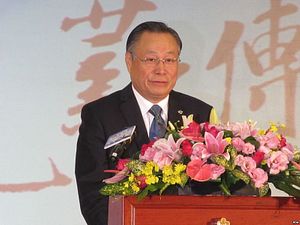The U.S. has agreed to help Taiwan build its own diesel-electric attack submarines (SSKs), Taiwan’s defense chief told parliament on Monday.
During testimony to the Legislature’s Foreign Affairs and National Defense Committee on Monday, Defense Minister Yen Ming told lawmakers that the U.S. “is willing to help us build the submarines together.” He added that Taiwan would continue to push the U.S. and other countries to sell it eight diesel-electric submarine.
Back in 2001, the U.S. under President George W. Bush agreed to sell Taiwan eight submarines to help it defend itself against China’s growing military power. Negotiations were slow at first due to financial constraints and domestic politics in Taiwan. Then, the U.S. stopped producing non-nuclear powered submarines. Finding a third country to produce the submarines has proved difficult due to China’s fierce opposition.
Defense Minister Yen’s confirmation comes just days after Taiwanese President Ma Ying-jeou told a U.S. think tank that Taiwan was pushing for foreign help in constructing its own submarines. Speaking by video to the Center for Strategic and International Studies last Wednesday, President Ma said: “There seems to be a consensus in Taiwan that we should seek foreign technology to help us build (the submarines) ourselves.”
Building eight diesel-electric submarines would greatly enhance Taiwan’s underseas capabilities against China. As Wu Shang-su wrote on The Diplomat last month, “After losing the opportunity to procure SSKs from the U.S. in the 2000s, an insufficient number of SSKs has been a major strategic flaw in Taiwan’s deterrence strategy. Its two Guppy II Class SSKs, of World War II vintage, are for training only, leaving two Dutch Zwaardvis Class vessels obtained in the mid-1980s as its only operational assets.”
This is crucial because anti-submarine warfare (ASW) is generally thought to be a weak spot for the People Liberation Army (although some foreign defense analysts now doubt this). Thus, the eight submarines could be essential to Taiwan’s ability to fend off an invasion from mainland forces, especially in light of China’s rapidly growing air and missile defense systems.
Acquiring the ability build submarines domestically would also ensure that Taiwan could continue fielding a potent submarine fleet despite growing pressure from China on the U.S. and others to not sell Taiwan military capabilities. Indeed, this is almost certainly a primary motivation behind Washington’s willingness to help Taiwanese shipbuilders acquire the expertise to build submarines.
Other countries like South Korea and Israel have relied on German technological assistance to acquire the expertise to build SSKs domestically.
Also on Monday, Defense Minister Yen told lawmakers that Taiwan was only interested in purchasing two Oliver Hazard Perry-class guided missile frigates from the United States. “The government originally requested to buy more than four of the warships from the U.S.,” Yen told lawmakers on Monday. “However, we have now decided that we only need two for the time being after a review of the procurement plan.”
In honor of the 35th anniversary of the Taiwan Relations Act, earlier this month the U.S. House of Representatives passed the Taiwan Relations Act Affirmation and Naval Vessel Transfer Act of 2014. As part of that act, which still needs the approval of the U.S. Senate and the signature of President Barack Obama, the U.S. would agree to sell Taiwan four of the guided missile frigates. Many in Taiwan have expressed opposition to the potential deal, citing the advanced age of the frigates and the fact that purchasing the vessels would constrain the military’s ability to purchase domestically made weapons.

































